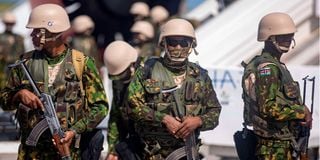
Kenyan police officers in Port-au-Prince, Haiti on June 25, 2024.
Two gang leaders in Haiti were arrested on Tuesday in a joint operation by officers from the Multinational Security Support (MSS) Mission.
Kenya, which has deployed a contingent of about 600 police officers, according to a disclosure to MPs by Inspector General of Police nominee Douglas Kanja, is leading the international policing mission in the war-torn Caribbean nation.
The members of the Chen Mechan and Pierre 6 gangs are in police custody being interrogated about the operations of the gangs. Police also recovered some weapons during the raids.
According to Mr Godfrey Otunge, who is the MSS Mission commander, the Kenyan officers and those attached to the Haiti National Police (HNP), have stepped up joint operations in the last three weeks.
“The last three weeks have seen sustained targeted joint security operations being conducted by MSS personnel and HNP. The joint security operations saw the destruction and removal of several barricades that enabled the clearance of roads that gangs had blocked,” Mr Otunge said.
The operations targeted gang-controlled areas which include Port-Au-Prince Downtown, Ganthler, Delmas, APN Port, Crole des Bouquets, and Tahare Carrefour.
During the operation, a double wall erected by the Mawazo gang on National Road 88 in Croix-Des-Bouquets, which is a commune in the Ouest department of Haiti, was brought down.
Croix-Des-Bouquets is located 12.9 kilometers to the northeast of Haiti's capital city, Port-Au-Prince.
Mr Otunge explained the destruction of the wall has allowed the free flow of vehicles and eased movement by the local population.
“Some of the key areas that the joint operations have been able to recapture and maintain dominance patrols include various streets in Delmas that were completely gang-dominated before the operations. Both vehicular and human traffic had been cut off with locals deserting these areas. Businesses had also shut down,” he said.
Normalcy is returning to various towns such as L'avenue Hallé Sélastié le Boulevard Toussaint Louverture (Route de l'Aéroport), l'Avenue Henri Christophe, la Rue Capols, l'Avenue Christophe, l'Avenue Lamartinière (Bois Vernoj, and Rue de la Réunion.
Others are; l'Avenue la fleur du chêne, l'Avenue de la République, Rue Capio (Champs de Mars), Rue Saint-Honoré, Grand Rue (Blvd Jean Jacques Dessalines), Rue Saint Honoré Avenue Magloire Amboise-Route des Dalles (Eglise Wedrycone).
This comes barely a week after notorious Haiti gang leader, Jimmy Cherizier, famously known as Barbecue protested that Kenyan police officers are ruthless.
He complained they had shot at his base using bullets and teargas.
“The police didn’t stop, they even came to almost the place that I was, shooting and also used teargas canisters,” he said.
Apart from Kenya, only Jamaica has a small contingent of 20 soldiers and four police officers.
Other countries contemplating sending their officers to Haiti are the Bahamas, Jamaica, Antigua and Barbuda, Italy, Spain, Mongolia, Senegal, Belize, Suriname, Guatemala, and Peru.
The mission is scheduled to end next month unless the United Nations Security Council approves another one-year extension that would see its mandate run to October 2025.
On Monday, the Kenyan Foreign Affairs ministry told Nation that negotiations to secure an extension were ongoing.
Principal Secretary Korir Sing’oei said that peacekeeping missions like that in Haiti have a one-year renewable mandate.
“Peace-keeping resolutions like the one Kenya is leading in Haiti are usually granted a one-year renewable term. However, negotiations to extend that for another year are ongoing,” Dr Sing’oei said.
More officers from several countries will be deployed to the Caribbean-based nation in phases and that would roughly cost 77 billion ($600 million) a year. So far the United Nations has $85 million in pledges for the mission, out of which $68 million has been received.
The US and Canada have provided the bulk of funds so far.







